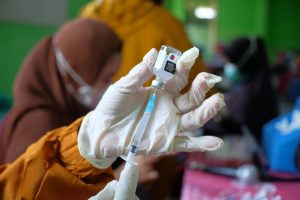An event earlier this month marked an important milestone in the expansion of China’s health diplomacy in Indonesia, which has picked up pace since the beginning of the COVID-19 pandemic. The event in question is the planned visit to the country of a People’s Liberation Army Navy (PLAN) hospital ship from Zhoushan in Zhejiang province, which set out on its journey on November 2.
Senior Col. Tan Kefei, a spokesperson for the Chinese Ministry of Defense, said that the purpose of the visit, whose exact timeline is unclear, is to provide outpatient and medical services for local residents. The ship, which the Chinese government calls the Peace Ark, will also provide certain kinds of inpatient services to Indonesians during its stay in the country.
The Peace Ark’s humanitarian mission, the second to Indonesia and 10th overseas mission overall, was not the first time that Jakarta and Beijing have cooperated in the healthcare field. Indeed, China’s health diplomacy in Indonesia has deepened considerably in recent years, due largely to the COVID-19 pandemic.
After the onset of the pandemic in 2020, the Indonesian government, like many nations, adopted a strategy of vaccine diplomacy aimed at securing an ample supply of vaccines for its people. This has involved outreach to various countries, including Japan, Australia, and the United States, though the most far-reaching cooperation took place with China.
This diplomacy began in March 2020, the same month that the World Health Organization declared COVID-19 a pandemic, when the Ministry of State-Owned Enterprises and Ministry of Health started seeking opportunities to cooperate with foreign companies to gain access to the COVID-19 vaccines that were then under development. In this diplomacy, Indonesia managed to hook the Chinese pharmaceutical company Sinovac Biotech Ltd. into a collaboration with the state firm PT Biofarma. Through this collaboration, Biofarma gained priority access to 40 million doses of Sinovac’s COVID-19 vaccine in 2021. Indonesia also entered a trilateral vaccine cooperation scheme with China and the United Arab Emirates, for the procurement of 20-30 million doses of vaccine in 2020.
China’s importance only increased as the pandemic went on. The Indonesian government set a target of vaccinating 181.5 million of the country’s 270 million people, but due to several delays in the delivery of the AstraZeneca vaccine produced by the University of Oxford, was forced to look elsewhere for vaccines. China was the one country that was both willing and able to supply the number of vaccines that Indonesia needed. Indeed, the most widely used vaccine in Indonesia was the China-produced Sinovac, of which 281,790,960 doses had been administered as of January 2022, or about 59.7 percent of the country’s total COVID-19 vaccines.
Chinese support took other forms as well. Less than a month after the Indonesian authorities identified the country’s first case of COVID-19, Beijing sent around 40 tons of aid for medical equipment to the country, including masks, gloves, personal protective equipment, and test kits. It followed this up in June 2020 with the delivery of 50 portable ventilators, 150,000 PCR test kits, 80,000 medical masks, 1.4 million surgical masks, and 80,000 pieces of personal protective equipment.
Then, last month, Indonesia inaugurated a biopharmaceutical factory to produce the Awcorna COVID-19 vaccine supported by technology from the Chinese company Suzhou Abogen Biosciences Co, Ltd.
Of course, China and Indonesia’s cooperation in the health sector long predates the pandemic. In 2017, the two countries signed a Memorandum of Understanding (MoU) regarding cooperation in Disease Prevention and Control, Health Human Resources Development, and Health Services.
Then, in February 2019 they began exploring cooperation related to Medical Device Clinical Trials. Indonesia held a direct meeting with the National Medical Product Administration (NMPA) to discuss this collaboration and visited three locations including Fuwai Hospital, Beijing Shijitan Hospital, and Peking University. This collaboration resulted in six points of agreement including one to increase the capacity of professional health workers via such means as scholarships from Tsinghua University and training sessions at Beijing University.
The initiative also involved the establishment of sister relationships and other collaborations between hospitals and institutions in both countries.
In more recent developments, in mid-2022, Indonesia and China signed a strategic cooperation framework agreement between China’s CAEDA (China-Asia Economic Development Association) Health Exchange and Cooperation Committee and the state-owned firm PT Makmur Berkah Sehat on the production of medical devices. This month, the Silk Road Fund, the Chinese government’s investment arm, signed an agreement with the Indonesia Investment Authority to become an investor in the state-owned pharmaceutical company PT Kimia Farma.
After trade and economics, the health sector has slowly become a priority area of China-Indonesia relations, especially since the COVID-19 pandemic. The friendly visit of the PLAN hospital ship to Indonesia this month is also a sign that the cooperation between the two countries is expected to continue and deepen in the years to come.
For China, health diplomacy could contribute to its efforts in maintaining its image in Indonesia, which has not been very positive lately. A survey by the Australia-based Lowy Institute conducted in November and December 2021 showed that 60 percent of Indonesians strongly agreed with the statement that “Indonesia should join forces with other countries to limit China’s influence.” In addition, 49 percent of respondents said they regarded China as a threat – and indeed, in the early days of the pandemic, many people in Indonesia believed that the spread of the virus in Indonesia was caused by the Chinese presence in the country.
If handled well, expanding its health diplomacy further could help China mend its image among Indonesians, which in turn could help secure its interests in a strategically vital part of the Indo-Pacific.

































